The Design Research, Writing, and Criticism program at the School of Visual Arts in New York City is a one year journey through the practice of analyzing and critiquing design for both academic audiences and the general public. Recently reconfigured from a two-year MFA that focused on criticism, the program is finding ways to be both more accessible to practicing professionals and more forward thinking about the place of research and criticism in today’s design world. I entered the program intent on improving my writing skills and left with a sharper understanding of my own proclivities around design, not to mention a thesis project that I’m totally in love with.
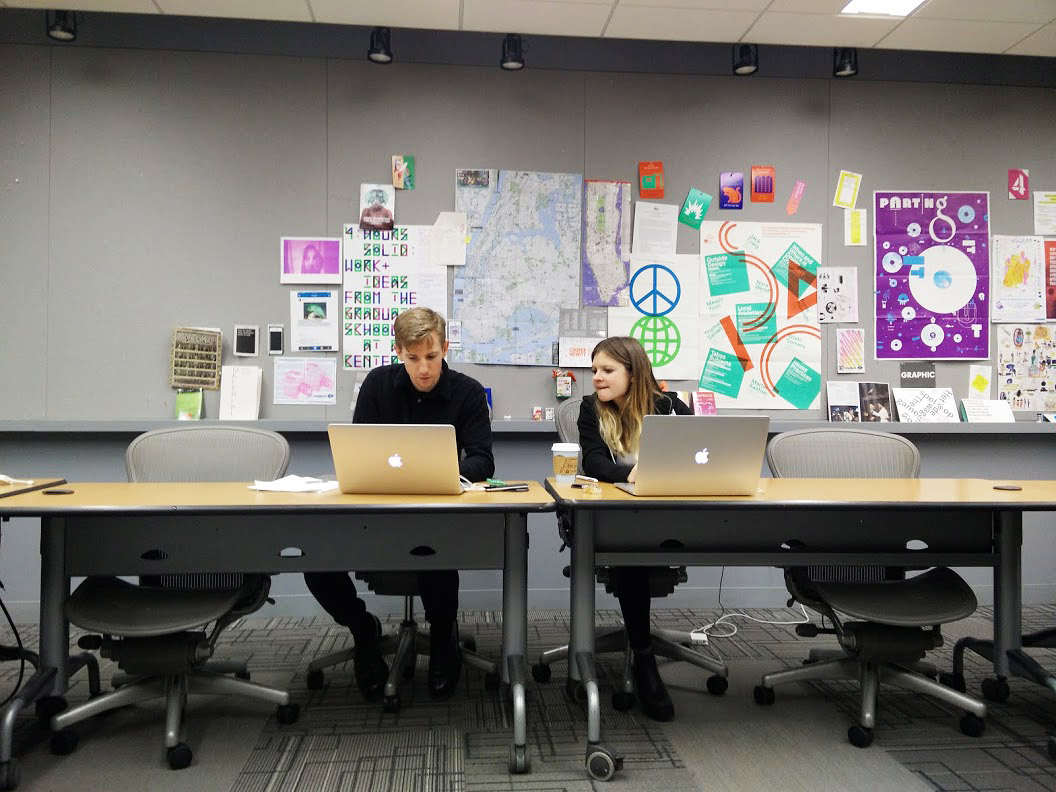 Derek and Hortense in the classroom.
Derek and Hortense in the classroom.
Why I went
I flirted with grad programs for upwards of five years before applying. As much as I love hands-on, tinkery, makery endeavors, the irreplaceable contributions I make to projects are primary research, strategic thinking, and imaginative leaps, so best to get a degree that would push those skills. (Take for example my experience in the School for Poetic Computation. I loved being a student, but my ongoing involvement is not through writing code but as a member of the Steering Committee for the school itself.)
I couldn’t wholly put aside the idea of working on a craft though, so the Design Research, Writing, and Criticism program won out over other programs for its focus on teaching quality writing. Despite any talent I have with words, baggage around growing up with stealth dyslexia dogs me to this day. Stealth dyslexia develops in smart kids who aren’t debilitatingly dyslexic when they are left to their own devices to get through traditional, primary school education. We create jerry-rigged mental hacks to get by and hide the fact that we are working double-time to keep up. We can hide it even from ourselves. Stealth dyslexics are notoriously good at persevering in the face of uncertainty and thriving in systems that aren’t designed to accommodate them. This is why it can be so humiliating when small errors with the “easy” stuff, like spelling, betray people’s confidence in our ability to do complex, demanding work.
Personal frustration with the emotional baggage of my stealth dyslexia mounted until I ran toward my fears by applying to a writing program. Even though no one at the program has an in-depth perspective on dyslexia, I hoped that confronting writing head on would force me to understand my cognitive style more thoroughly.
What I did
To succeed in a short graduate program, it was paramount to walk in the door with a thesis project in mind. I knew I wanted to study experience design, especially experiences that required active participation and some sort of relinquishing of control on the part of the guests. I further narrowed down the range of experiences by focusing on those that offered the potential for human enrichment and transformation. After surveying game design, anthropology, sociology, and psychology texts in the first-semester literature review, I identified four broad areas of any social experience with transformative potential. I then applied this lens to sex parties, funerals, and wilderness trips to discover what high-level design decisions need to be made when exposing people to primal risk in a caring way.
While some of the uncomfortable, scary parts of the masters had to do with the nature of any educational process, some of them came from a methodological mismatch between me and the department that only surfaced with time. I was dumbstruck to realize that my notion of design didn’t interface nicely with the department’s notion of design.
Having studied media, technology, and games in my BFA at Parsons, I took for granted a systems-minded approach. The department prides itself on welcoming a wide variety of research subjects, but it flourishes best when limiting design to things you can look at, hold, or walk through. (Think: a storefront, a youtube ad, a pamphlet, a doll, a coin, a housing complex.) This might explain why the program can falter when dealing with systems, technology, innovation, and human experience. (Think: a game, an algorithm, a database, a methodology, a meal, an event).
I certainly could have chosen a thesis topic closer to home for the department, like found photographs or derelict buildings, but that analysis would have been trite compared to the bigger questions I had about why the games and adventures I designed could at times produce unanticipated, transformational effects on people and if the effects were a product of the design.
The department repeatedly asked me to justify how my thesis research fit within the field of design. Surprised and distraught, I asked outside mentors about this. They scoffed at the notion that social relations and experiences aren’t designed. So, I weighed my options. Should I spend my time in the program justifying my inquiry or should I spend my time doing the primary research? I chose the latter. And it seems that either choice would have sunk me. At my final defense, I was held up as an example of how not to use your time in the program because I failed to analyze the “look at, hold, walk through” stuff of the experiences I studied, like room layouts, lighting choices, and the typography of invitations. Indeed, the favored projects in my year were all grounded in a semiotic analysis.
In order to maintain my line of inquiry without being overpowered by the department’s predilections, my mind gradually erected an impenetrable mental wall every time I had to analyze objects or visuals, causing me to faultered with some assignments outside thesis. I didn’t understand what the block was about until the second semester was in full swing. The realization came at one of the department’s public lectures. The program’s branding visuals were projected on the screen, a busy grid of objects and images removed from their contexts as if selected out as specimens of study filling rows of square Petri dishes, each one overlaid with the department’s logo. “All that stuff,” I thought. I knew that if I got lost in the material, visual stuff of the experiences I studied, I would miss the fleshy, feely, human “transformation” parts that were the point of doing the research in the first place. (It’s like studying a game of chess by looking at the game board and pieces alone. You miss the complexity produced by the ruleset and the interpersonal dynamics ignited through play.) But here I am in a program that runs so eagerly toward the stuff. “Oh, yeah, I’ve gotten myself into some sticky trouble here,” I thought. The Petri dish grid suddenly sickened me.
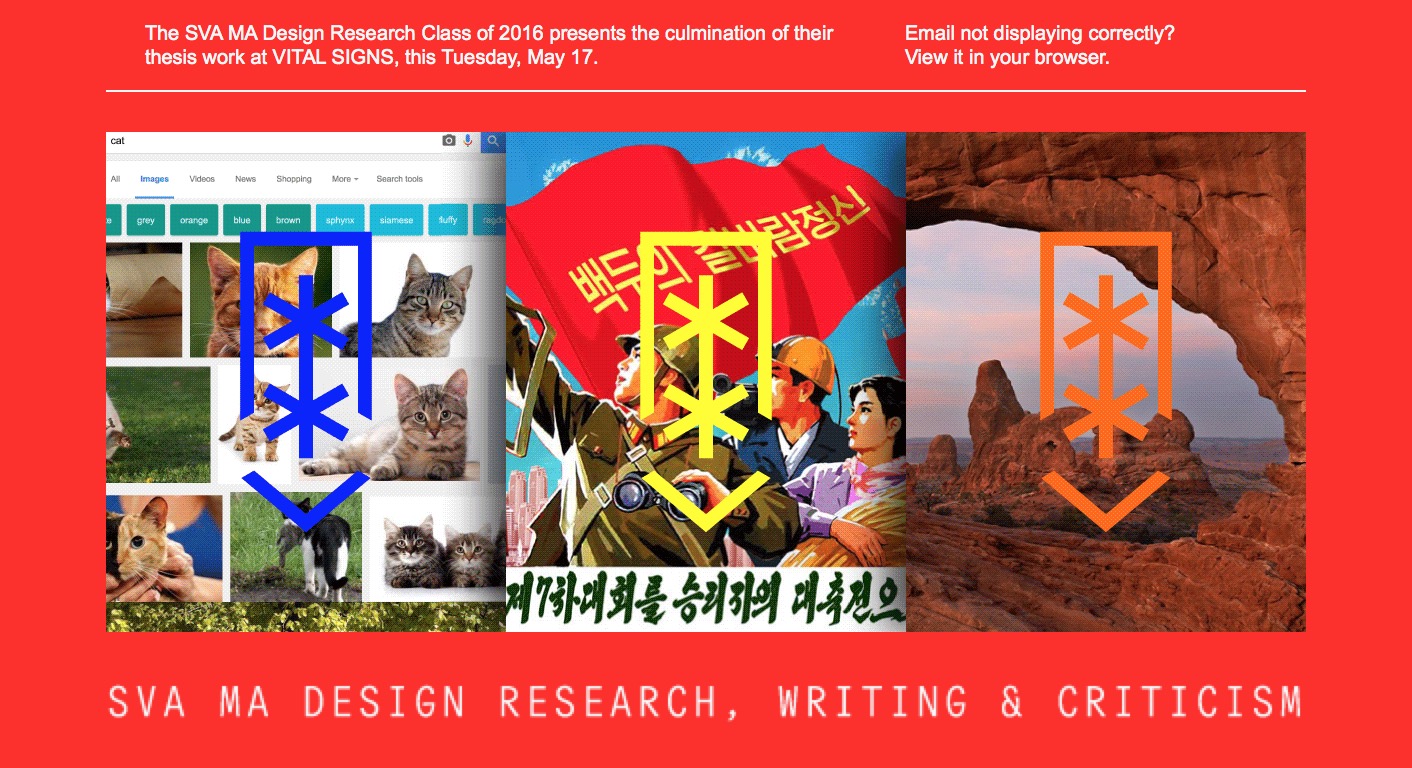
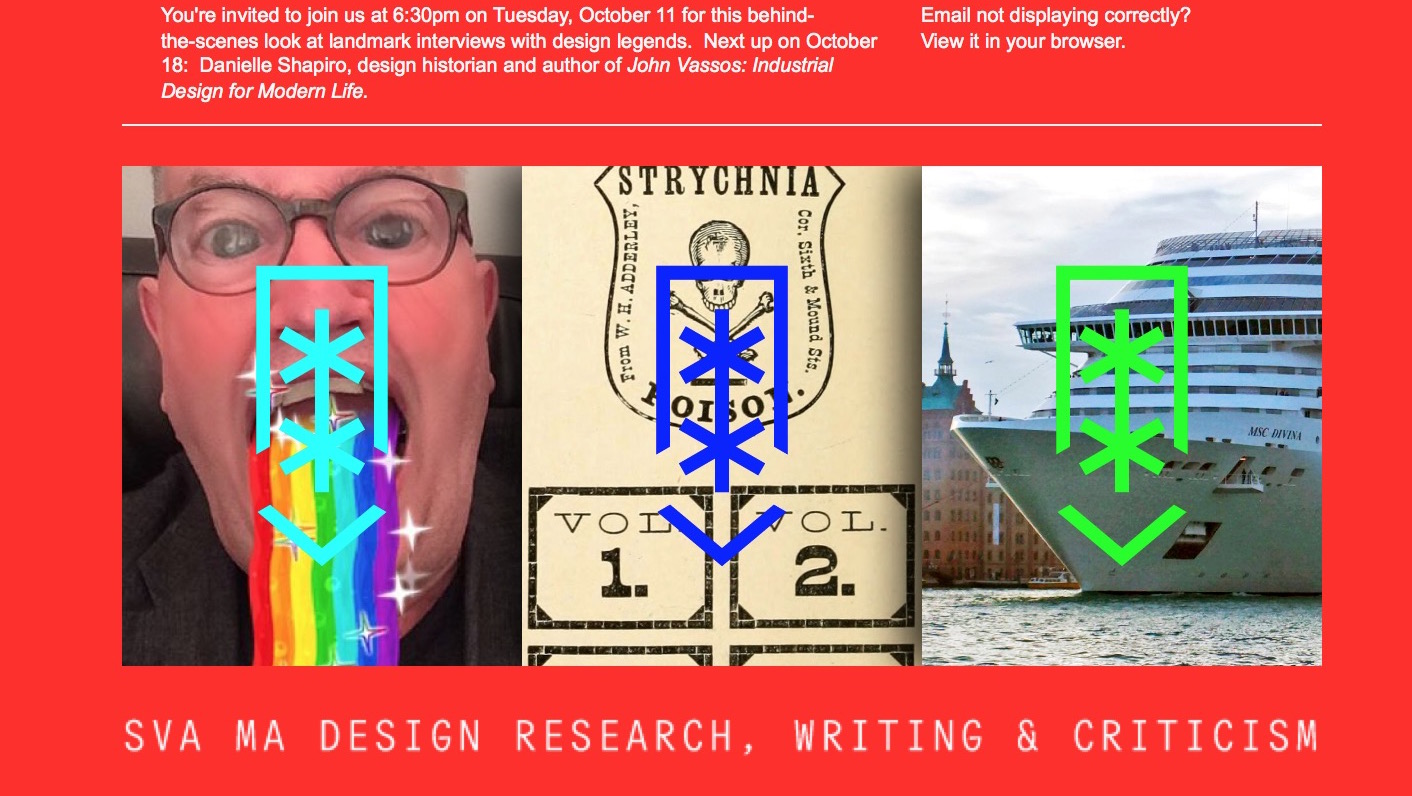
The department’s object grid branding as used in email blasts.
Another place where I ran into trouble involved the tension between research that informs a design process and criticism that pinpoints a design’s value (or lack thereof) in the world. My cohort was only the second batch in the newly reformatted version of the program that was once a Design Criticism MFA and is now a Design Research, Writing, and Criticism MA. I was squarely on the research end of things, gathering insights to inform and enable new work. How this tension will play out as the program settles into its new format is yet to be seen.
(I’m happy to report that while drafting this review, the department invited me to advise on curriculum changes inspired by technology and systems thinking, starting with a discussion series for the current students.)
Success in The End
Despite all the discomfort and the methodological clash, the thesis process totally worked. Advisors coaxed me into adopting a more open-ended thesis question than I initially proposed in my application. The literature review revealed unanticipated insights that set the parameters for the primary research. In the end, I came up with findings that feel like design secret sauce even more delicious than I could have hope for. The process was uncomfortable and even scary at times. (Education is a transformative experience, after all.) I couldn’t have done it without the support and structure of an academic program. I had a blast with the work. Even though I was not exactly applauded at my thesis defense, I passed with a good grade and the powers that be congratulated me on improving my writing notably through the program.
In the end, I do think I’ve inadvertently become a better critic, which is such a relief. I haven’t always been the most graceful in delivering criticism. While I stand by my insights, they are best aired in ways that can help improve the work of the people and organizations I believe in. Success lies in both the quality of the insights and the technique of the delivery. While I expect that much of my criticism work will be behind closed doors in advisory roles, the tact and savvy needed for public criticism has certainly raised my standards for criticism generally.
So What of This Dyslexia Thing?
It turns out that dyslexics are hard wired systems thinkers who make sense of the world by creating complex models in our minds and fitting new information into those models. We’re also adept at learning through experience and accessing insights through vivid, contextual memory. (I wish I had a more succinct source for this, but Dr. Enright’s presentation at Microsoft does a better job explaining it than anything else I’ve looked at.) In many ways, my research process mapped neatly onto my strengths. I had a vague sketch of those strengths before starting the program, but going through it and stepping back to notice how different my process was from many of my classmates, painted the strengths in technicolor.
I had hoped that the program would force me to slow down and reflect more on all the experience I had so I could synthesize insights and writing around them. My own intrepid tendencies foiled those hopes as I leveraged the structure of the program to enable new kinds of adventuring. My thesis propelled me to attend as many sex parties, funerals, and wilderness trips as I could. I was understandably criticized for this in the end since I had failed to get out of my comfort zone in doing my thesis work. Oops!
One dyslexic strength that became unexpectedly vibrant is the disconnect between written language skills and oral language skills. The neuroscience of how humans decipher verbal communication differently than written language is opaque to me. All I know is that completely different parts of the brain handle each and process them differently. The famous dyslexic weaknesses in the mechanics of written language are generally offset by uncommon strength in oral communication. Before starting the program, I knew I was a competent public speaker, but I didn’t realize how much of a strength it was until I got consistent positive feedback on my presentations through the entire school year. As soon as I picked up on this, I started using speech-to-text to compose first drafts of papers. It might scandalize the faculty to know that my highest marks were for papers “written” with speech-to-text in the 11th hour before they were due. The piece of my thesis portfolio that received the most polish (thanks to department chair Molly Heintz’s wonderful coaching) and the most attention was not the thesis document itself, but my Businessweek talk. (Thank you also to my outside advisor Christian Howard for the zombie politics nerd fest.)
Anyone who thinks in systems is a sucker for a good feedback loop. Most assignments involved sharing only one final version and then moving on to the next assignment. In a few cases where the stakes were higher, I brought in a shadow team of discussants and editors to help me through the process, creating the feedback loops I needed to produce higher quality thinking and writing. (Thank you, thank you Myric Lehner, Lois Beckett, and Toni Pizza.) Even still, some of my best writing all year happened in Slack, prompted by dialogue with my classmates.
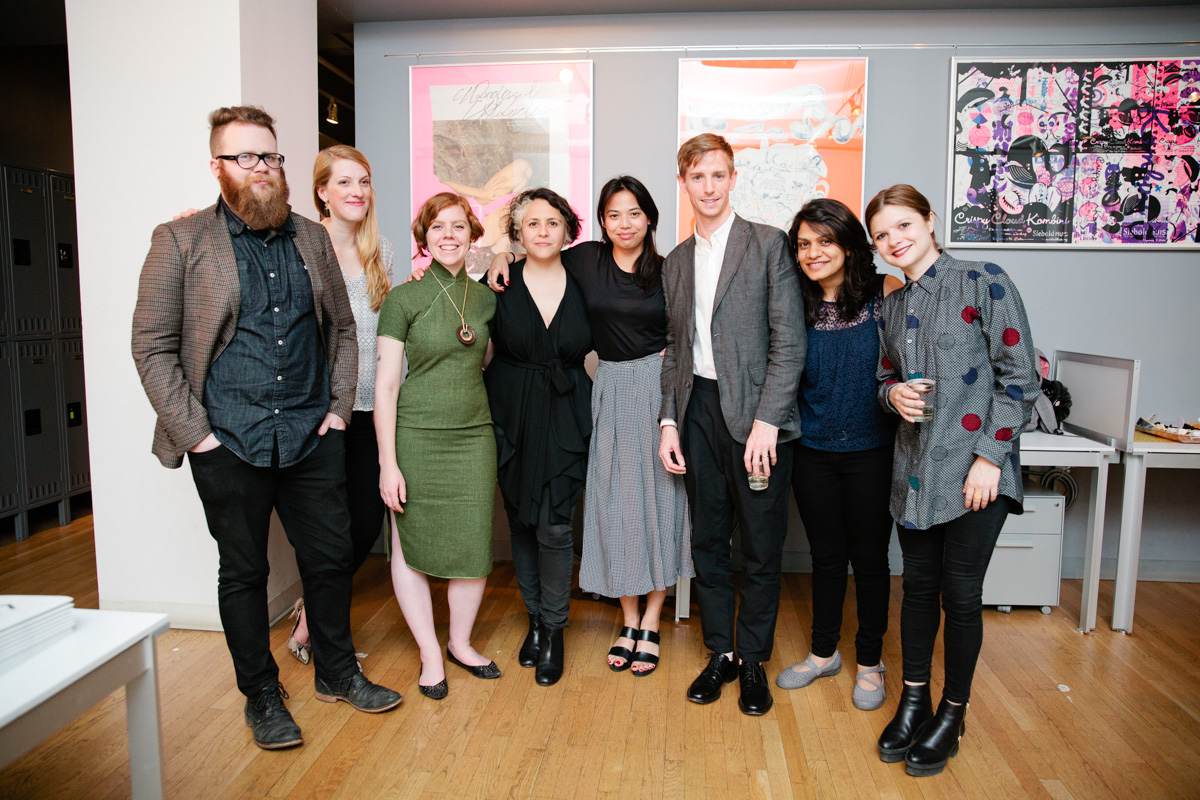 Here’s most of the 2016 class after the public thesis presentations in May.
Here’s most of the 2016 class after the public thesis presentations in May.
What’s Next?
The research is in a strong place, but it’s not done yet. I want to put out a version accessible to practitioners, so morticians, wilderness guides, sex party purveyors, educators, and modern convenors of all kinds can more readily compare notes. I’m still looking for all the funeral invitations I can get. Enough with the sex party invites. Got plenty of those.
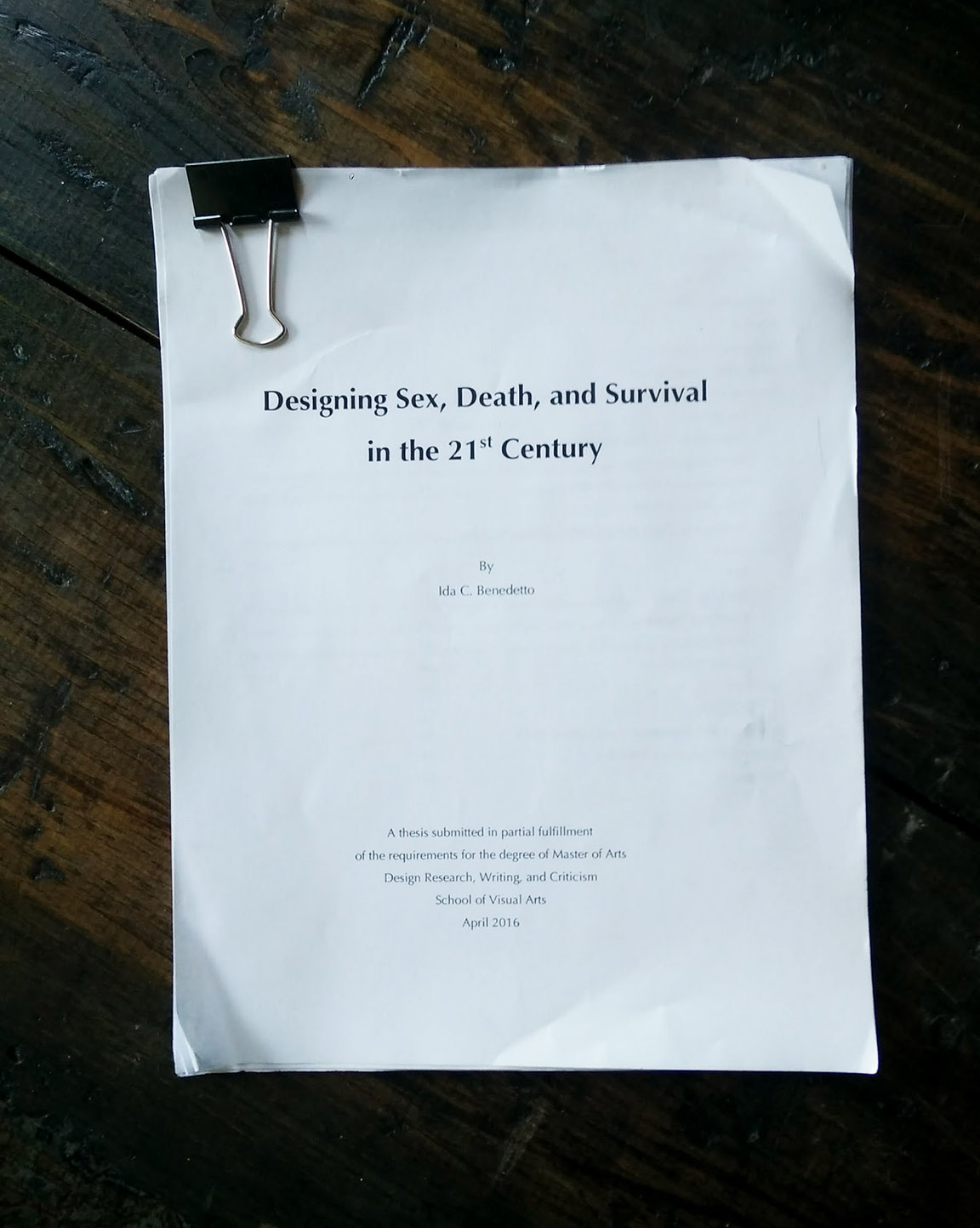 The finished thesis.
The finished thesis.